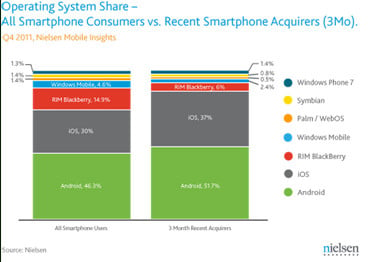Is Apple really 'closing the gap' on Android as far as smartphone market share is concerned, or is there more to the battle of the mobile handsets than the latest set of headline figures suggest?
Certainly if you take the research, and associated press releases surrounding it, from Nielsen regarding smartphone sales then you might be forgiven for thinking that Android handsets are in danger of being overtaken by iPhones in terms of handsets in, well, hands. The NeilsenWire release in question doesn't help by loudly proclaiming "More US Consumers Choosing Smartphones as Apple Closes the Gap on Android" - a headline which has been copied by news media outlets pretty much word for word in many cases, although some have opted to leave the 'consumer' bit out, and a sentiment which has certainly been echoed as if Gospel in the vast majority of those news stories which I have bothered to read.
The Nielsen research points at the launch of the iPhone 4S in the back half of last year as the driver for this apparent 'surge' in Apple smartphone popularity, which is hardly surprising in my opinion. After all, just look at the media feeding frenzy whenever Apple throws any new product into the pool. The TV coverage bordered on the insane, especially considering that 'new' in the case of the 4S (which, I should point out before I get accused of Apple bashing, I own myself and am more than happy with) actually turned out to be 'much the same as before with a few additional tweaks' truth be told. Nielsen reports that 44.5 percent of folks asked in December said they had opted for an iPhone (and 57 percent of those an iPhone 4S) compared to 25.1 percent back in October.
So, taken at face value you could say that there had been a surge in iPhone popularity, yes. As far as consumers, and US-based consumers at that, are concerned the iPhone 4S effect has had an impact on the Android market share as measured by the Nielsen reporting metric. Android saw a drop from 61.6 percent market share to 46.9 percent between October and December 2011, while iPhones jumped up from 25.1 percent to finish the year just behind the Androids on 44.5 percent.
Part of the problem in taking these numbers and concluding that the iPhone is about to seriously kick some Android ass, is that human nature is such that people will hold back from buying an iPhone until the 'new' model is released. Media coverage continues for months before the actual product is available, in effect depressing iPhone sales until the launch happens when, boom, a flurry of activity boosts the numbers up. The other part of the problem is that the Nielsen numbers relate to the percentages buying new smartphones, not the actual market share at all. All that increased were the number of people buying new iPhones (on the back of a new model launch) compared to those buying new Androids, during a three month period leading up to Christmas.
The truth is that both Apple and Android are doing well, especially when you take a slightly broader look that includes global business and tablet users; and with more than 250 million Android devices activated so far (50 million of them in the last couple of months alone) Google is far from out of the race or even flagging noticeably. You simply cannot take information that addresses a short term snapshot of a particular section of the market and somehow extrapolate from that, as some media outlets have done, that one player is about to capture a bigger slice of the overall market share...

